

The One Show: Rosie King and Brain in Hand. Please Talk. VIDEO: AsIAm Says Hi - What supports are available to students with Autism? - asiam. A blind student's guide to choosing a university. Choosing a university can be difficult for any student, but being blind brings all kinds of extra considerations.
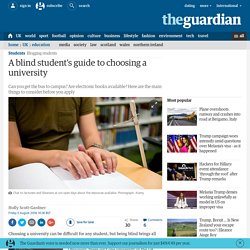
Obviously, there isn’t one university in the UK that is a perfect fit for every blind student. We’re all individuals with an incredible variety of interests and support requirements. Getting Around UCD VideoMap Series - Intro. Student Toolkit – A Guide to Succeeding in College. Planning the trannsition to college. Click the Buy Now button below to purchase and download a printable PDF version of the workbook, or scroll down to learn more about what's inside.
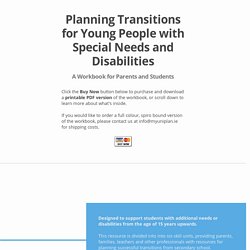
If you would like to order a full colour, spiro bound version of the workbook, please contact us at info@myuniplan.ie for shipping costs. Designed to support students with additional needs or disabilities from the age of 15 years upwards. This resource is divided into into six skill units, providing parents, families, teachers and other professionals with resources for planning successful transitions from secondary school. The workbook helps students to identify strengths, challenges, needs and aspirations, and to turn these into achievable goals, focusing on: Building personal skills Developing learning skills Exploring post-transition options Using human and technological support Learning to be independent Managing the transition bridge.
AutismUni Best Practice Guide 02. Succeeding in College with ADHD. ADHD support at third level: ‘It’s better to get help, even if you feel babied’ There are a number of supports available to students with attention deficit disorder (ADD) and attention deficit/hyperactivity disorder (ADHD), in colleges around the country.
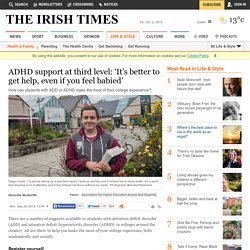
All are there to help you make the most of your college experience, both academically and socially. Register yourself. What Freshers' Week is like when you're deaf. Freshers’ Week at university is meant to be one of the most exciting experiences anyone can have.
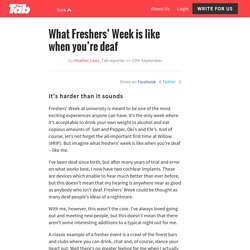
It’s the only week where it’s acceptable to drink your own weight in alcohol and eat copious amounts of Salt and Pepper, Oki’s and Efe’s. And of course, let’s not forget the all-important first time at Willow (#RIP). But imagine what freshers’ week is like when you’re deaf – like me. I’ve been deaf since birth, but after many years of trial and error on what works best, I now have two cochlear implants. These are devices which enable to hear much better than ever before, but this doesn’t mean that my hearing is anywhere near as good as anybody who isn’t deaf.
With me, however, this wasn’t the case. A classic example of a fresher event is a crawl of the finest bars and clubs where you can drink, chat and, of course, dance your heart out. I guessed it wrong. 8 Tips for Starting College. Years of watching American tv shows and movies have prepared you for this moment, or at least given you a very unrealistic view of what college life is.
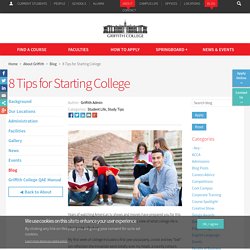
You’re now a fresher! My first week of college included a first year pizza party, a lock and key “ball” (on reflection the innuendo went totally over my head), a county colours night (standard) and a UV paint party (too messy for my liking). The first week of lectures was filled with much confusion over building names and room locations, the realisation of “Oh!
The notes are on Moodle - fab!” Disclosure. Disclosure means informing someone or to make the information known, in this case to the employer or your college, about your disability, specific learning difficulty or mental health difficulty.
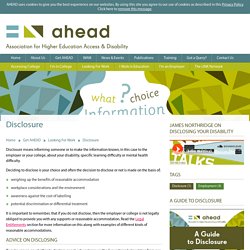
Deciding to disclose is your choice and often the decision to disclose or not is made on the basis of; weighing up the benefits of reasonable accommodation workplace considerations and the environment awareness against the cost of labelling potential discrimination or differential treatment It is important to remember, that if you do not disclose, then the employer or college is not legally obliged to provide you with any supports or reasonable accommodation.
Read the Legal Entitlements section for more information on this along with examples of different kinds of reasonable accommodations. Advice on Disclosing If you’re unsure on whether to disclose or not, why not answer the 5 questions below taken from our Disclosure publication. Useful supports and services in college from Caerus Education. Disability Supports & Services. 1st Year: What to Expect. Fully accessible accommodation is difficult to secure and some students, especially students with a physical disability, will face difficulties when seeking accommodation.
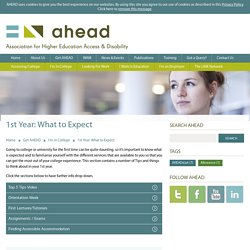
The larger universities and colleges provide on-campus student rooms and residences, but only a small number of these may be fully accessible to those with mobility impairments, blind, or deaf students. On Campus Accommodation. Blog: Surviving College 101. Wednesday, 26th August 2015 It’s that time of year again, students are busy preparing for the college year 2015/2016.
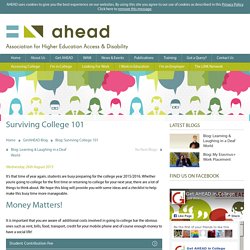
Whether you’re going to college for the first time or returning to college for your next year, there are a lot of things to think about. We hope this blog will provide you with some ideas and a checklist to help make this busy time more manageable. It is important that you are aware of additional costs involved in going to college bar the obvious ones such as rent, bills, food, transport, credit for your mobile phone and of course enough money to have a social life! Student Contribution Fee The Student Contribution Fee or Registration Fee as it’s sometimes called, is a fee that undergraduates students who are in receipt of the ‘Free Fees’ scheme have to pay. Helping Students Transition to College 21 Tips. Moving on to college - Siraj's story. University challenge 2013. My Asperger's makes living with other students a struggle. Starting university is a big step for everyone, but for me it was a little more daunting as I have Asperger’s syndrome.
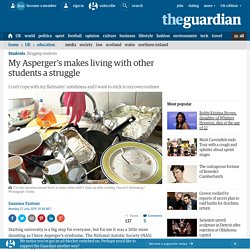
The National Autistic Society (NAS) describes the condition as a “hidden disability” because you can’t tell from someone’s appearance that they have it. The main symptoms of the condition, which is a form of autism, are problems with social communication, interaction and imagination. Some common characteristics include a love of routines, having special interests and sensory difficulties. Asperger’s made living with other students a challenge during my first year at university, which I have just completed.
Because some of the most common problems associated with Asperger’s are related to socialisation, meeting new people and making friends was extremely difficult. Moving in with new flatmates is hard – people you’ve never met before become a huge part of your everyday life and, for some, this is too much. It isn’t just the social side of things that are challenging. Guide for staff in FE HE. Preparing for Adulthood. Chanelle tells us about her transition to Liverpool University.
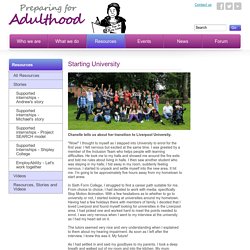
5 Tips for New College Students with Disabilities. Young People's Experiences with Epilepsy. Here young people talk about their experiences of studying at college or university, the impact epilepsy had on studying and what helped them in their studies. Studying and courseworkSeveral young people we spoke with were either studying at university or at college. A few had found getting into university relatively easy but several had struggled to find a suitable course. Some said that, partly because of the problems caused by the epilepsy or the medication (for example concentration and memory problems, general disruption caused by frequent seizures), their A-level results hadn't been good enough for them to get into university and they'd had to modify their plans.
<div>Please enable Javascript to watch this video</div> view profile Profile Info Age at interview: Sex: Female Age at diagnosis: Background: Being a Student AS Support Service Disability Service:Trinity College Dublin. Progressing through College: Being an Undergraduate Transitioning from secondary school to third level education and experienced your first year as an undergraduate student presents a challenging experience for many students. In particular, moving from a strictly ordered regime of classes and homework to a setting where class attendance is mostly optional and coursework assigned weeks before the deadline is quite shocking for new students.
DIT Careers - Engaging First Years. Employability is "the development of a set of aptitudes, attitudes and attributes which enable DIT students and graduates to develop academically, vocationally, socially and personally, empowering them to contribute meaningfully to society and the economy in career paths which are personally fulfilling and successful”. (Kilmartin, 2014) Connect, Commit, Communicate - Transition into First Year workshop. Reflections of a First Year.
Rebecca reflects on her first year in college, and offers five lessons to help you in your initial year of studying abroad. It seems like it was just yesterday that I had my first week of lectures, and as I look back on this year I can honestly say that it has flown by so quickly. But, as the lectures and exams came to a close, I have had some good time to reflect on my first year here at DCU, and I’d like to share some lessons I have learned so far!
Lesson 1: Get involved During my first year orientation, I remember one of the DCU representatives saying that the first month of college will determine a lot about the remainder of the year. Although at the time I didn’t think they were right, I now see that this statement rings with truth. Life at UCD - Students Unplugged - Advice for First Years. You arrive at university. What should you be doing? Where should you be going? Take my advice - My life on campus - Pathways to Trinity. Top tips for college newbies - SpunOut.ie. Print Sorcha's advice for flying the coop. The Leaving Cert results are out and so is the CAO. TCDSU Mental Health Week 2011 "Dear First Year Me" How to survive School and College with Asthma. Surviving College as a Coeliac. HADD College Guide for Students with ADHD.